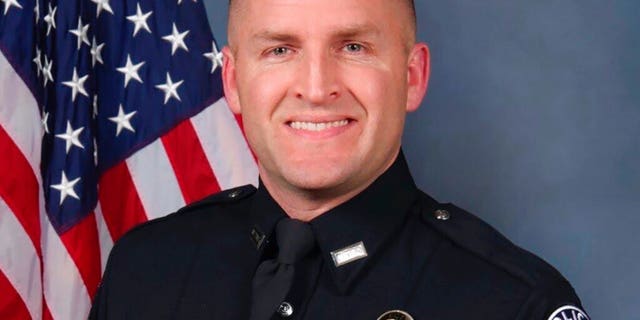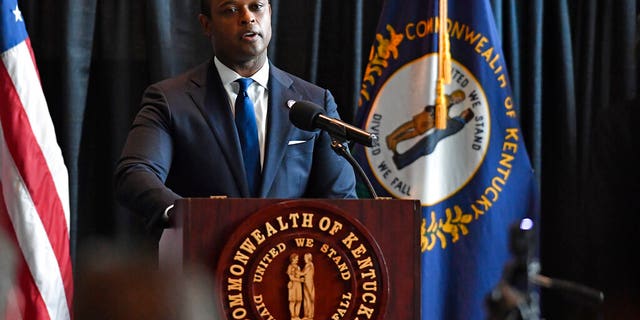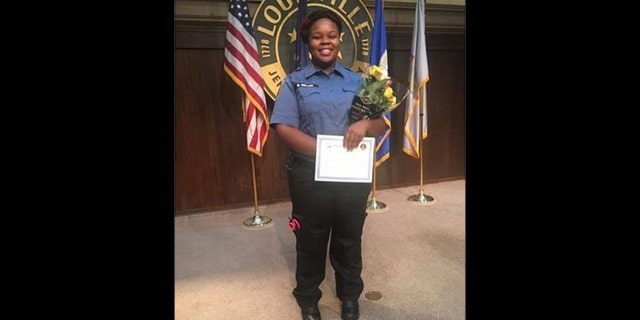Former Louisville police officer Brett Hankison, one of three cops involved in a deadly March drug operation that left Breonna Taylor dead, was indicted on three counts of first-degree wanton endangerment.
Taylor was a 26-year-old Black woman who worked in emergency medical services.
The charge is a Class D felony under a Kentucky law that took effect in 1975, with each count carrying a possible sentence of 1 to 5 years in prison and fines as high as $10,000.
Hankison was fired June 23 for his role in the operation – accused of recklessly firing multiple bullets into a neighbor’s apartment. Hankison was not charged in Taylor’s death, but rather for endangering her neighbors’ lives.

FILE – This undated file photo provided by the Louisville Metro Police Department shows officer Brett Hankison. A Kentucky grand jury on Wednesday, Sept. 23, 2020, indicted the former police officer for shooting into neighboring apartments but did not move forward with charges against any officers for their role in Breonna Taylor’s death. The jury announced that fired Officer Brett Hankison was charged with three counts of wanton endangerment in connection to the police raid of Taylor’s home on the night of March 13. (Louisville Metro Police Department via AP, File)
“A person is guilty of wanton endangerment in the first degree when, under circumstances manifesting extreme indifference to the value of human life, he wantonly engages in conduct which creates a substantial danger of death or serious physical injury to another person,” the statute reads.
BREONNA TAYLOR SHOOTING: FIRED LOUISVILLE OFFICER INDICTED ON CRIMINAL CHARGES BUT NOT HER DEATH
The other two officers involved in the operation, Sgt. Jonathan Mattingly, who was shot in the leg, and Detective Myles Cosgrove, were not indicted, according to Kentucky Attorney General Daniel Cameron.
Cameron said he did not expect additional charges in connection with their entry into Taylor’s apartment on March 13.

Kentucky Attorney General Daniel Cameron addresses the media following the return of a grand jury investigation into the death of Breonna Taylor, in Frankfort, Ky., Wednesday, Sept. 23, 2020. Of the three Louisville Metro police officers being investigated, one was indicted. (AP Photo/Timothy D. Easley)
BREONNA TAYLOR’S ATTORNEY ON GRAND JURY DECISION: ‘OUTRAGEOUS AND OFFENSIVE’
Carl Takei, a senior attorney with the American Civil Liberties Union, blasted the charges Wednesday afternoon, saying they showed “modern policing and our criminal legal system are rotten to the core.”
“The charges brought against Officer Hankison state that Hankison violated standard operating procedures when his ‘actions displayed an extreme indifference to the value of human life.’” Takei said in a statement. “The choice to bring these charges alone and so late highlights the indifference to human life shown by everyone involved in Breonna Taylor’s murder.”
Takei called for “sweeping changes” that include “divestment from these broken institutions and reinvesting in non-police alternatives.”

Breonna Taylor was a 26-year-old African American emergency medical technician.
(Taylor family photo)
During a news conference after the grand jury’s decision to indict Hankison, Cameron said his office had explained all of Kentucky’s homicide offenses while presenting the case to the jurors.
“The grand jury was ultimately the one that made the decision about indicting detective Hankison for wanton endangerment,” he said, arguing that the criminal justice system is not always equipped to address tragedies.
“I don’t think we want a justice system that is in the business of fashioning facts or laws to a particular narrative,” Cameron said. “We have to be in the business of presenting the information to the grand jury and ultimately allowing them a decision about what to do subsequently.”
The attorney general also announced a new task force to examine how Kentucky handles and serves criminal warrants.
Officers at the time of Taylor’s death were serving a drug warrant connected to a suspect who did not live there and who was already in police custody. They found no drugs in her apartment.
The officers entered the apartment and were allegedly met with gunfire from Kenneth Walker, Taylor’s boyfriend. His defense attorney said in court filings that Walker fired in self-defense because he thought the men were trying to break in.
Stray bullets struck the sleeping Taylor six times in her bed. Walker was not injured in the shootout
CELEBS REACT TO GRAND JURY INDICTING 1 POLICE OFFICER INVOLVED IN BREONNA TAYLOR SHOOTING
Louisville’s Metro Council has since banned the use of no-knock warrants.
Cameron, during a news conference following the indictment, said the officers had knocked and identified themselves at Taylor’s doorstep. That account was corroborated by a single civilian witness, leading to questions about whether the officers took sufficient measures to identify themselves.
When asked if a single witness was “sufficient” to support that version of events, Cameron said the decision ultimately came from the members of the grand jury, who were presented with “all the evidence” investigators gathered.
“[The grand jury] got to hear and listened to all the testimony and made the determination that Detective Hankison was the one that needed to be indicted,” he said.
CLICK HERE TO GET THE FOX NEWS APP
Walker was charged with attempted murder of a police officer, but the count was later dropped.
Fox News’ Danielle Wallace and Barnini Chakraborty contributed to this report.